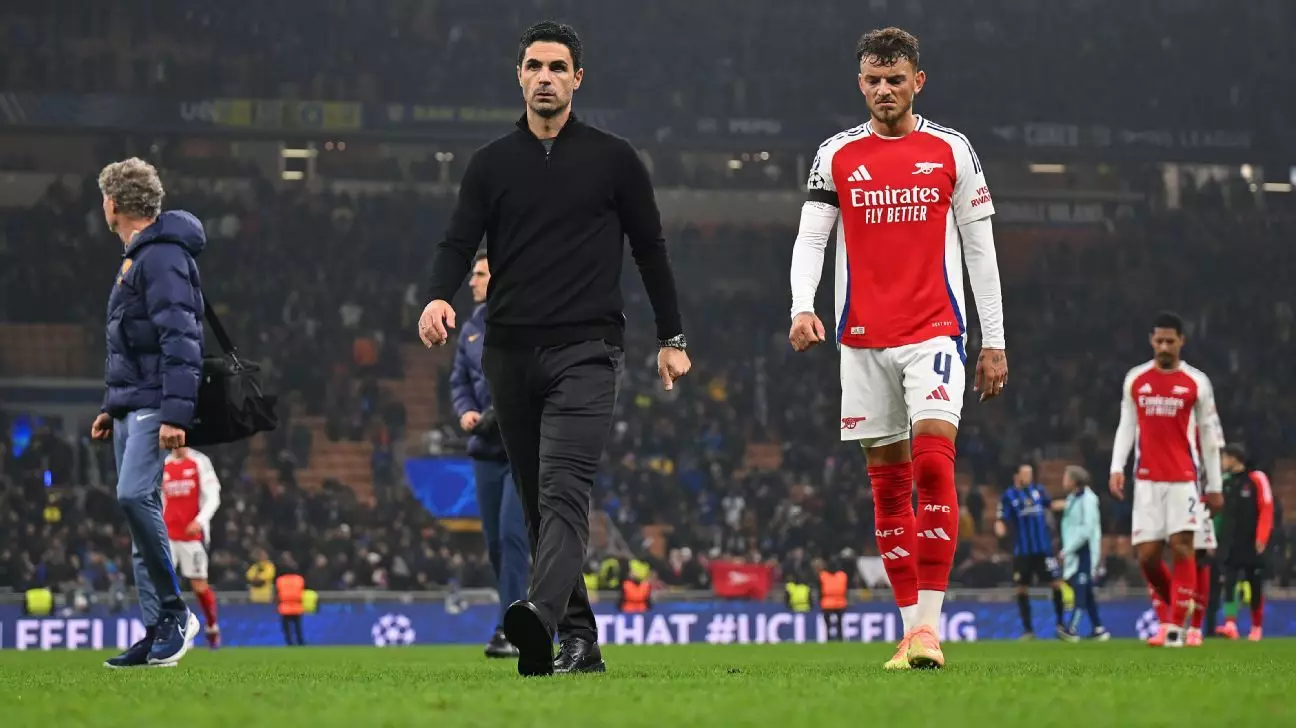Arsenal’s hopes of a successful season are now shrouded in uncertainty after a 1-0 defeat to Internazionale in the UEFA Champions League. This loss has raised significant doubts about their chances of finishing in the top eight and securing automatic qualification for next year’s tournament. The defeat in Milan comes on the heels of several troubling incidents affecting the club, including the sudden resignation of sporting director Edu Gaspar and a worrying seven-point deficit to Premier League leaders Liverpool. While recovery is still possible, the once-promising trajectory of the club now seems precarious.
This recent dip in form and fortune casts a shadow over the steady progress the team has demonstrated over the last two years. As the club grapples with injuries that have disrupted its rhythm, manager Mikel Arteta’s frustrations were palpable during the match. Key decisions by the officiating team have only added to the turmoil, highlighting the thin margins that define success at this level of competition.
Against Internazionale, one of the most contentious moments occurred in the first half when Arsenal’s Mikel Merino found himself at the center of two critical decisions that swung the match. A potential penalty for Arsenal, which could have altered the game dynamics, was denied when VAR intervened, leaving Arteta and his players incredulous. Merino appeared to be fouled by goalkeeper Yann Sommer when attempting to score, but the decision went in favor of a corner kick instead.
Later, Merino was penalized for handball in a moment that seemed unfortunate, as the ball struck his hand in what many would argue was an unavoidable circumstance. Arteta’s post-match comments reflected his dissatisfaction as he insisted that if one incident warranted a penalty, the other should have as well. “I don’t understand the decision,” he lamented. “The ball is very close, and you cannot react in that time. These are the margins in this game, and they are difficult to accept.”
The penalty awarded to Inter, expertly converted by Hakan Çalhanoglu, set the stage for a defensive performance from the hosts. Arsenal dominated possession throughout the match, failing to translate their control into tangible goal-scoring opportunities. Despite an onslaught of crosses—46 in total—none were converted, leaving them with only missed chances and a growing sense of frustration.
Arteta attempted to put a positive spin on the loss, claiming that this was one of the team’s best performances in Europe in recent years. However, such statements may be viewed as stretching the truth, particularly given the team’s overall struggles. Too many players, including Leandro Trossard and Gabriel Martinelli, failed to shine on the night, leaving Arsenal lacking the spark necessary to penetrate Inter’s defenses.
Keen observers will note the ongoing criticism regarding Arsenal’s summer transfer strategy, particularly the lack of sufficient support in attacking areas. The team’s reliance on captain Martin Ødegaard to reinvigorate their attack has never been more apparent. Ødegaard’s return—after a significant injury layoff—came too late to impact the result against Inter. Arteta’s hope relied heavily on the ability of Ødegaard to quickly regain match fitness and provide leadership on the pitch.
Injuries and inconsistent performances from many key players, such as Kai Havertz, who continues to seem lost in his new environment, raise significant questions about the depth and resilience of this Arsenal squad. This need for reinforcements and tactical adjustments becomes increasingly urgent as the team struggles to regain its footing.
With three losses in their last six matches, leading to mounting pressure on the club’s shoulders, Arsenal’s upcoming fixture against Chelsea becomes pivotal. Arteta must instill confidence and instigate a turnaround, emphasizing the importance of results in a league where success often hinges on consistency across a long season.
The challenges ahead require more than words of encouragement; tactical realignment and player performance must improve. The Gunners must rally to combat their current slump, or risk that the uncertainty surrounding their season graduates from a passing concern into a more deeply rooted crisis.
Arteta believes that a turnaround is imminent, stating, “If we play the way we played, we have a good chance to win against Chelsea.” For the sake of the club’s ambition and fan base, it is imperative that Arsenal rises to the occasion and transforms their outlook—beginning with their clash at Stamford Bridge. The time for action is now, or the ramifications of this uncertain period may resonate well beyond a single season.

